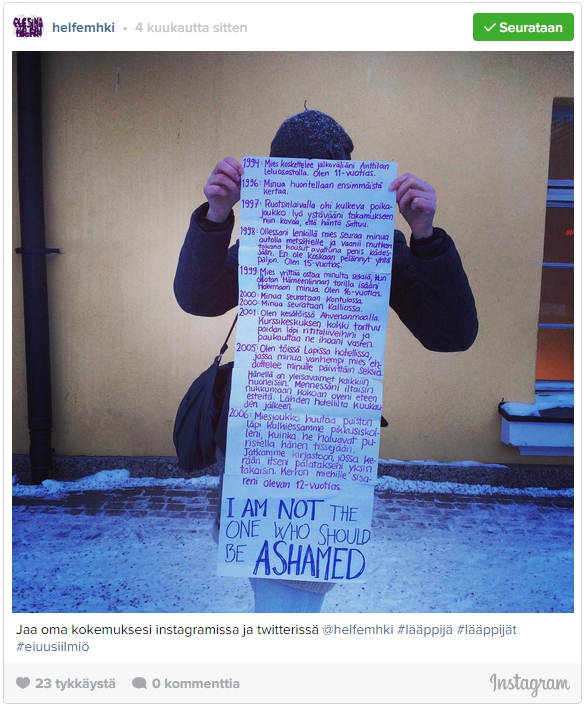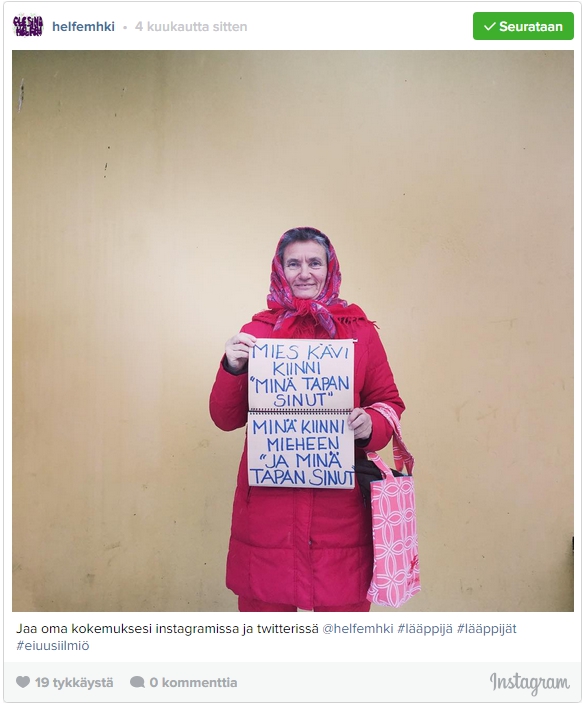Lääppijä is a subject derived from the Finnish verb “lääppiä”. It can roughly be translated to as “groper” and can be understood as a person engaging in socially aggressive, sexually inappropriate behavior. Despite the term having an aged sound, it captures the nature of sexual harassment better than many of its English counterparts due to its vague connotation. This very term became a hashtag after a high-ranking police officer claimed that sexual harassment did not exist in Finland before the events of New Year’s Eve of 2015.
Many Finns share an illusion of the superiority of their nation and the people in it. Even if nationalistic pride has some benefits, and can show healthy national self-esteem and belief in the social systems, it does also bring out strong a confrontation between “us” and “the others” as a form of social exclusion. The Finnish example can be clearly seen in the public discussion about sexual harassment, which has its roots in this single hashtag, #lääppijä. The campaign began when an obscure statement was made by the Finnish police, which is a highly trusted institution in Finland especially when compared globally.
As it is often the case, there is an interconnection between misogyny and racism. The campaign derived due to a separate phenomenon which occurred after the New Year’s Eve of 2015. The Finnish police received a tip that there was going to be a large scale sexual harassment by asylum seekers on New Year’s Eve a few months before. As a precautionary move the Finnish police detained three Iraqi asylum seekers before the celebrations of the New Year’s Eve started.
The Illusion of the Chivalrous Finnish Men
The Finnish deputy chief of police in Helsinki, Mr. Ilkka Koskimäki told the international media that “[T]his phenomenon is new in Finnish sexual crime history. We have never before had this kind of sexual harassment happening at New Year’s Eve.”
His statement was false. The image given by deputy chief of police was found widely inaccurate by many women. In fact, the statement was so deluded that the outcry of the punchline – that sexual harassment had not existed in Finland before refugees – was immediate. Social media and particularly the Twittersphere activated to demonstrate how wide and historical sexual harassment is and has been in Finland.
The use of the hashtag #lääppijä started a spontaneous reaction, which quickly became viral and over 15 000 tweets were posted over a few days. Many courageous women shared their stories on how they had been harassed, shamed, abused and sexually assaulted during their lives. The depth of the stories traveled back to decades of sexual harassment. Public figures, politicians, journalists and artists shared their experience of being harassed. Many of the 140 letter anecdotes went back in history to the 1980s and 60s. The pervasive nature of the phenomenon and the constant flow of messages came as a surprise to many male followers of the hashtag, who personally knew the people contributing.
For most men it was a shock how widespread harassment still is. There is still a strong culture of shame and silence about sexual harassment in Finland. Unsurprisingly the majority of women were already aware of it. This also includes transwomen and anyone associated with femininity. A few stories from men also appeared, which stood out because of their rarity, but a major reaction was deep disgust towards the banality of sexual harassment.
A Spontaneous Response
The nature of the hashtag shares many similarities with the American #FirstTimeIWasCatcalled and German #ausnahmslos. The aim was a tad different, as it mainly showed that sexual harassment was all to common to the fairly homogenous, white, protestant, Finnish male population. The variety of harassment came from people the women knew, who worked with them, who they were related to, who they considered friends as well as some random strangers. Alarmingly these experiences began also at very young ages.
The campaign was not created by a feminist organization nor did it have backing by public relation or media offices. Even the person who initiated the campaign with the now-famous hashtag was surprised how much attention it garnered. It created a new environment, where people could publicly announce the amount of harassment they had dealt with through their lives.
The campaign was of course imbued with a hint of humor. Some people started to point out that a lot of similar behavior is present in the Finnish national epic – Kalevala – which is set in prehistoric Finland. Even with the seriousness of the topic, a sarcastic tone was often involved when the campaign faced the usual arguments about the vigilantism of Finnish men (aka. not all the men).
The Backslash and Xenophobic Counter-reaction
As expected, some men’s rights activists reacted to the campaign by blaming women for also harassing the Finnish men. However these tragicomic outbursts did not receive much publicity. Also many of the women who shared their stories encountered the usual forms of slutshaming, internet bullying and trolling. A few of those who took part in the slutshaming were male politicians, most notably a few connected to the right wing populist parties.
Even though the Global Gender Gap report places Finland amongst the most equal countries in the world (highest rank within EU), other statistics show that true equality is still far away. According to a study by the EU’s Fundamental Rights Agency, Finland is the EU’s second most violent country for women.
The nature of the traditional forms of Finnish sexual harassment tells a sad story. The majority of domestic violence and sexual abuse is perpetuated by Finnish men. This fact however is often neglected in media representation, a fact that leads to the reshaping of attitudes towards sexual harassment and violence, especially depending on its surroundings. Racially focused journalism tends to overemphasize certain ethnicities and forms of sexual harassment. A similar attitude was evident during the media coverage concerning the events at Cologne on the New Year’s Eve.
Again a number of islamophobes hijacked the hashtag to promote their racist agenda with an antifeminist connotation. It captures the double standards and falsehood, which underlie the xenophobic way in which women’s rights can sometimes be promoted. Many national feminists became vocal about the facts, how often Finnish men themselves often perpetrate sexual violence. Around 1000 cases of rape per year do not attract media attention as they happen domestically and the background of the perpetrator does not stand out from most of the population. Many arguments used by conservatives and xenophobes capture the grim nature of misogynism and racism in Finland. The unspoken idea present in this kind of thinking is that “Only Finnish men are allowed to rape Finnish women”.
Sexual harassment itself was not in the Finnish criminal law before September 2014, and the law still fails to include verbal harassment. The first sentences where the clause was used to prosecute sexual harassment came in the summer of 2015. Within the first nine months there was a total of 128 cases where the new law was applied.
#Lääppijä served as a grim reminder of how mundane sexual harassment is. Even if the Nordic countries are considered to amongst a few of the most equal countries, they are still far behind true equality, abolishing sexual harassment and racism. Finland has a long way to go and part of that progress requires an honest dialogue, which allows women to voice their grievances, their anger and their experiences and, most importantly, to be heard. A single hashtag is not much, but it can show how common sexual harassment truly is.
Please note that many of the references are in Finnish.
Suomessa on aina ollut seksuaalista häirintää. Jopa esihistoriallinen suullinen perintö tuntee kähmijä-Väinämöisen. Tästä huolimatta Helsingin apulaispoliisipäällikkö Koskimäki väitti alkuvuodesta 2016, ettei Suomessa ole ollut seksuaalista ahdistelua ennen maahanmuuttajien tuloa. Suomalaiset twitterin käyttäjät vastasivat tähän voimakkaasti. #lääppijä -tunnuksella merkityt kertomukset alkoivat kuvailla miten tavallista seksuaalinen ahdistelu on Suomessa. Häirintä ei ole uusi ilmiö.
Apulaispoliisipäällikkö Koskimäen väite liittyi kolmen irakilaistaustaisen turvapaikanhakijan pidätykseen. Pidätettyjen miesten epäiltiin suunnittelevan seksuaalista ahdistelua vuoden 2015 uudenvuodenaattona. Suomalaisen poliisin esittämät väitteet seksuaalisen ahdistelun historiattomuudesta ovat valheellisuuden lisäksi myös yhteiskunnallisesti hälyttäviä. Suomalainen poliisi on luotetumpi kuin poliisi missään muualla maailmassa. Tästä syystä poliisin sana on erittäin painava. Se myös nosti aiheen suurempaan keskusteluun
Koskimäen kommentin takana oli vahva oletus siitä, että “kantasuomalaiset miehet” eivät syyllisty seksuaaliseen ahdisteluun. Tämän väitteen valheellisuuden tiesivät kuta kuinkin kaikki suomalaiset naiset ja feminiinisiksi oletetut henkilöt. Siinä missä poliisi leimasi maahanmuuttajat pahoiksi ahdistelijoiksi, vaarallisempaa oli hiljaisesti erottaa “kantasuomalaiset”miehet hyviksi ja naisia kunnioittaviksi kansalaisiksi.
Suomalainen Twitter on kohtuullisen pienen piirin leikkikenttä, eikä sinne mahdu kovin suurta ilmiötä. Kun Koskimäen lausuntoa kommentointiin ensimmäistä kertaa #lääppijä -tunnisteella, sen olisi ollut helppo jäädä muutaman käyttökerran jälkeen unohdetuksi yritykseksi. Juuri tästä syystä hashtagin leviämisvauhti kertoo siitä, miten voimakkaasta ja vaietusta ilmiöstä oli ollut kyse. Muutaman päivän aikana twiittejä oli 15 000, mikä on suomalaisten twitterkäyttäjien keskuudessa valtava määrä. Se osittain kertoo siitä, miten paljon seksuaalista häirintää todellisuudessa tapahtuu. Hashtagin tarkoituksena oli tuoda usein vaiettu seksuaalinen ahdistelu julkiseksi. Siinä se todellakin onnistui.
Usealle keskustelua seuranneelle miehelle ahdistelukokemuksien laajuus aiheutti hämmennystä. Seksuaalisen ahdistelun tavanomaisuus on suomalaisessa keskustelukulttuurissa yhä tabu. 140 merkkiin mahtuvat kertomukset tulivat useilta eri tahoilta, joista useat olivat myös julkisessa asemassa. Ahdistelukokemuksia löytyi monelta vuosikymmeneltä. Se ei ole uusi ilmiö, eikä myöskään maahanmuuttajien mukana tullut ilmiö.
Suomesta puhutaan usein etenkin suomalaisten keskuudessa tasa-arvon mallimaana, jossa äänioikeudesta lähtien ollaan aina oltu edellä muuta maailmaa. Samalla varjoon jäävät useat suomalaiselle kulttuurille tyypilliset, tasa-arvon kannalta synkät tosiasiat. Suomi on yhä Euroopan Unionin toiseksi väkivaltaisin maa naiselle. Vain marginaali raiskaustapauksista herättää huomiota, ja nekin useimmiten vain jos näitä tapauksia voidaan käyttää rasismin oikeutuksena. Vuosittain Suomessa poliisin tietoon tulee yhä tuhat raiskausta. Näistä valtaosa ei herätä suurta mediahuomiota. Naisten oikeudet nousevat puheeksi usein vain rasismin varjolla.
Myös itse lainsäädäntö ei ole riittävä ahdisteluun puuttumiseksi. Ahdistelu on ollut rikos vasta vuodesta 2014 saakka, eikä se vieläkään pidä sisällään kaikkia ahdistelun muotoja. Myös kynnys ilmoittaa ahdistelusta ja seksuaalisesta väkivallasta on yhä korkea. Samalla seksuaalinen häirintä on yhä arkipäivää. Vaikka Suomi usein piilotetaan parhaimmassa valossa näyttäytyvien tilastojen taakse, tasa-arvo ei ole valmis. #lääppijä nosti esille räikeän esimerkin siitä, miten kaukana tasa-arvoinen yhteiskunta yhä on.
Lähteet tekstin tilastoihin löytyvät englanninkielisestä versiosta, joka on myös sisällöltään laajempi.



![On slut-shaming – the case of Estonia – MEENUTAME: TOP 20 kõige kahjustavamat noortenõu Dr. Noormannilt* [EN/ET]](https://www.youngfeminist.eu/wp-content/uploads/2016/01/24534942415_3175234776_b-150x150.jpg)


Average Rating